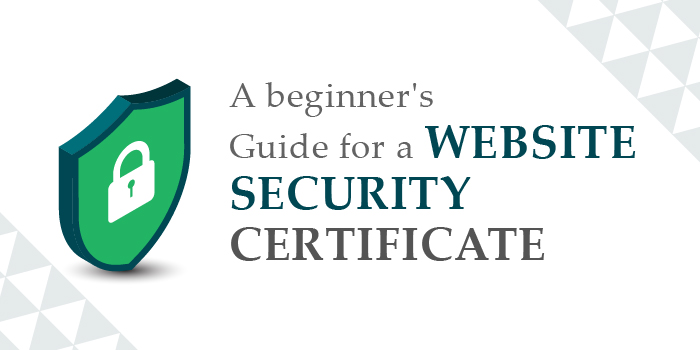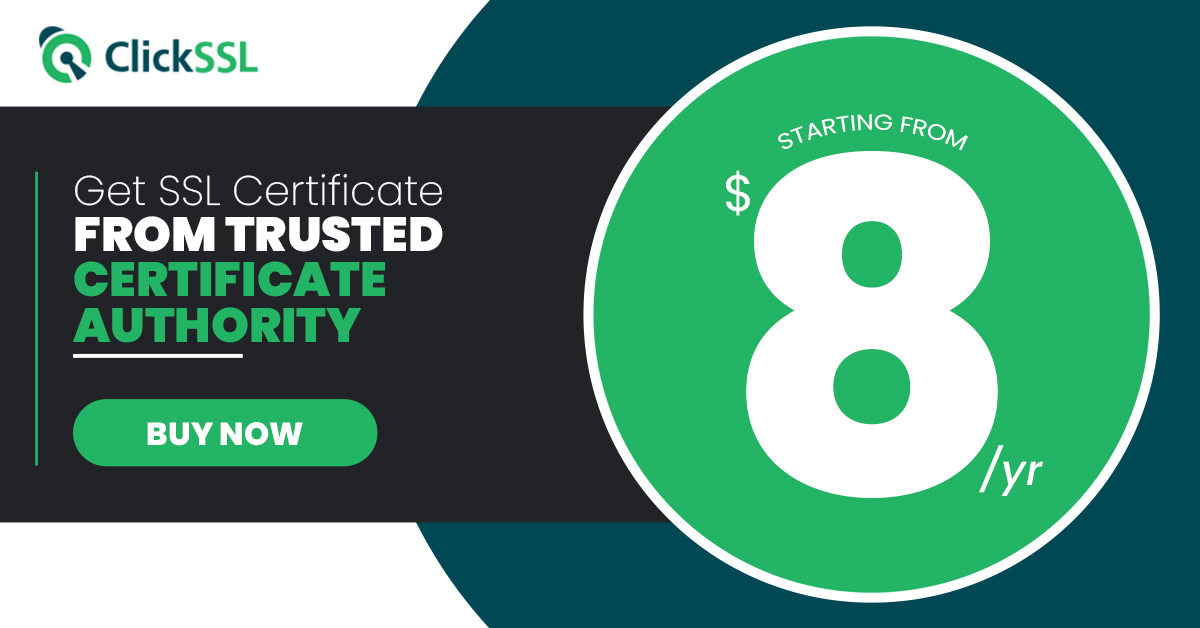Website security certificate is proof that a site is digitally encrypted by industry trusted Certificate Authority (CA).
Website security certificate proves to users that they are visiting a real website and not a fake one. A website security certificate is offered after following the domain ownership, and business validation process. A validation process is attempted to verify that the certificate is issued to the real business and domain name. The main motto of website cert is to establish a business identity and save users from visiting a fake website.
Due to the rise in cybercrime, identity assurance is required nowadays. Cybercriminals are now making users fool by luring them to visit a bogus websites. Once users visit such websites and enter their credentials, cyber thieves get them and misuse such information.
Further, security certificates provide website security and create a secure channel between the client and the server allowing secure online transactions. It establishes trust in customers’ mindsets and assures them that their information will remain secured on a website.
What is Website Security Certificate?
A website security certificate sometimes referred to as the HTTPS certificate or SSL security certificate, is a digital certificate that activates the HTTPS protocol. It is installed on the web server and provides encryption and third-party validation based on the type you choose.
This certificate is issued by a Certificate Authority (CA), who is a trusted third party authorized to sign, seal, and issue an SSL certificate when a request is made by the website owner or any other authorized person. After that, depending on the type of SSL security certificate applied, the CA performs the validation and, upon successful completion, issues the certificate.
Why Website Security Certification Matter?
Website owners must invest in website security certificates for enhanced security and higher credibility. As the HTTPS certificate enables the HTTPS protocol, the client-server communication is encrypted, blocking unauthorized third parties from intercepting data. So, the financial details, usernames, passwords, and all other data remain accessible only to those who have the private key.
Besides security, it also improves the online reputation of a business by acting as a trust seal that tells the users that your site is secure and has been verified by the CA. Also, it prevents miscreants from impersonating the website and using it to commit fraud or other crimes to destroy your business reputation. Instead, it provides an avenue for legit businesses to voluntarily opt for a more comprehensive validation process and earn the trust of their users.
This works extremely well for e-commerce businesses and online service providers that operate without physical offices. They get to confirm their credibility and generate more business by differentiating themselves from scammers.
Finally, you can up your SEO game by installing an SSL certificate because Google considers that to be a ranking signal. This is in pursuance of Google’s HTTPS-Everywhere initiative to make the internet safer by encouraging website owners with a perk to install an SSL. If you quickly run a search for any term, you’ll see that all the top-ranking sites run on HTTPS.
How Website Security Certificate Work?
The HTTPS certificate encrypts client-server communication using the Transport Layer Security (TLS) protocol, which is often referred to as SSL. The Secure Socket Layer or the SSL is now obsolete, and what we currently use is the TLS protocol. For the HTTPS to work, a valid SSL/TLS certificate is required and must be installed on the web server.
Then, whenever a browser tries to communicate with the website, the communication begins with a TLS handshake — a process in which the client verifies the server and procures the public key. In this process, the server sends details such as SSL version, cypher settings, and session-related data to the client, which are necessary to communicate over SSL.
Upon successful authentication, the client creates and sends the session key after encrypting it with the server’s public key. The server then uses the public key to decrypt the data received. For each session, a different session key is used to ensure that the two parties interacting are who they claim to be. It also confirms that the data exchanged is not altered during transit.
Authentication & Trust: Website Security Certificates Help People Know That You’re You
A free SSL comes in a domain validation type, which can be issued within a few minutes, while paid SSL can be organized and extended validation. An organization validation requires verification of business documents and domain ownership. The certificate authority verifies the website’s status and checks business records. It takes three to four days to the issuance of such a certificate. On the other hand, the EV (extended validation) certificate is one step ahead of the organization validation certificate, thoroughly checking the business documents, legal, physical, and operational existence. It takes up to 5 days for certificate issuance.
However, both types of validations aim to validate business identity and assure customers about website security and data protection. It means your website is trustworthy and not a fake one. It is important to make your website legitimate with higher validation to create trust among visitors and customers. Therefore, using a website security certificate is essential these days.
What Are the Different Types of Website Security Certificates?
Website Security Certificates or SSL security certificates can be classified into three types of SSL certificate — the Domain Validated (DV) SSL, Wildcard SSL, and the SAN or Multi Domain SSL security certificate. This classification is based on the encryption coverage provided by each SSL and is the most widely accepted norm.
However, these three web security certificates can be further subdivided based on the level of validation that the CA provides. The three levels of validation are Domain Validation (DV), Organization Validation (OV) and Extended Validation (EV).
Generally speaking, all the SSL certificates are domain validated because that is how the CA confirms domain ownership, but the other two are optional. As the name implies, the organization validation or its close variant, the Individual validation, is designed to validate that the individual or organization is who it claims to be.
In Extended validation, the CA does not stop there and confirms the existence of a business, its ownership, and its current operational status. So, that is how web security certificates are classified. With that out of the way, let us now discuss the different types more elaborately.
Domain Validated Certificate
A DV SSL is a cheap SSL certificate capable of encrypting communication between a primary domain or a single subdomain and the client. This SSL type is the easiest one to get as there is no other type of validation involved, but it has its limitations. For instance, a website with seven subdomains will require eight DV SSL certificates to be fully encrypted. This may work out cheaper but brings along administrative complexities such as maintaining multiple private keys, tracking renewals and fixing glitches caused due to multiple SSLs.
Wildcard SSL Security Certificate
A Wildcard SSL certificate is an advanced web security certificate that gets its name from the wildcard character or the asterisk used while applying for this type of SSL. So, the applicant requests a certificate to be issued to *.YourWebsite.com — the asterisk denotes all the pre-existing and future first-level subdomains and must be explicitly stated in the SSL application. This encrypts first-level subdomains like cart.YourWebsite.com or login.YourWebsite.com, but not android.mobile.YourWebsite.com or admin.login.YourWebsite.com.
As the subdomains are encrypted with a single wildcard certificate, it eliminates the need to install multiple DV SSL certificates. So, no more tracking renewals of multiple SSLs nor the need to safeguard multiple private keys. Also, the Wildcard SSL usually comes with the organization validation option, which makes it ideal for small and mid-sized businesses like e-commerce websites, affiliate sites, small business websites, etc.
Multi-Domain SSL Or SAN Certificate
The Multi domain SSL certificate or SAN SSL security certificate is also known as the multidomain or the Unified Communications Certificate (UCC) and is usually available with extended validation. This SSL type can encrypt multiple websites, mail servers, and IPs, making it ideal for large businesses with complex requirements. However, these come with a maximum cap on the number of domains that can be encrypted, and you must consider that before buying one.
How Do Site Owners Get a Website Security Certificate?
Website owners can get a website security certification by applying for one through a reliable SSL provider that offers certificates from highly credible CAs. For example, ClickSSL offers cheap SSL certificates from reputed brands like Comodo, RapidSSL, Thawte, GeoTrust, etc. Plus, it lets you compare the prices and features offered by different CAs and pick the one that works for you.
After choosing a web security certificate from an SSL provider, the next step is to furnish the necessary documents based on the type chosen. Usually, the issuance process takes from a few hours to 7 days, depending on the level of validation sought. The highest amount of time is required for the EV SSL because of the thorough check that the CA performs.
So why should you buy one? Most free SSLs are DV SSL certificates generated through an automated system without any manual verification. This is not the case when you buy one from a reputed SSL provider because then your details are sent to the CA, who performs a thorough check and validates your business. Other benefits of getting a web security certificate from a reputed SSL provider include huge discounts, a warranty against mis-issuance, and a superior trust seal.
How Can Website Security Certificate Be Upgraded?
Many website owners start with a DV SSL certificate and then switch to a more advanced SSL type as their needs grow. Usually, this is done to reduce the costs associated with SSLs that come with a superior validation like the OV or EV.
So, you might want to upgrade to a more advanced SSL when your business starts generating profits. When you get to that point, you can upgrade your website’s security by purchasing an SSL that fits your budget and serves the purpose. Once that is issued, remove your existing SSL, install the new one, and you are done.
How to Use a Website Security Certificate to Check an Organization’s Information
If you are exploring a website and want to know whether the site is secure and belongs to a particular business or organization, simply click on the security padlock button in the URL bar. You will then see an option called ‘Certificate,’ click on that, and you should be able to confirm the name of the Issuer, the organization to which the SSL has been issued, and the validity of the SSL certificate. Here is detailed guide.
Final Takeaway for Website Security Certificate
From the above, it is quite clear that choosing the right SSL Security certificate is an intricate process that requires a proper understanding of a business model and its web architecture. Since the DV SSL is a basic HTTPS certificate, it is always recommended that businesses opt for a more comprehensive solution or at least upgrade when they can afford one.
Cybercrime is increasing at a rapid pace, and any neglect in choosing the right SSL can backfire. However, if an informed decision is made and the SSL is properly installed, it can prevent a vast majority of the attacks launched on a website.
Finally, website owners need to understand that installing a web security certificate is not the end of it. Several other cybersecurity measures must be implemented to make the site safe for users.
Recommended Reading



